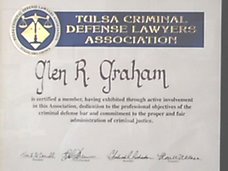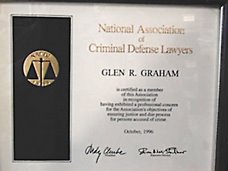DOMINION AND CONTROL DEFENSES TO DRUG CHARGES
by Glen R. Graham, Attorney at Law, Tulsa, Oklahoma
Web Page: http://www.glenrgraham.com/
Here are some ideas. On many criminal drug cases, there is a question of dominion and control. Who has the right to control the disposition of the drugs? Three people are riding in a car and drugs are found under the seat of one person, but not in plain view. Assuming no one confesses, then this is a classic "dominion and control" question. Sometimes, the police will arrest everyone and then later charges will only be filed against the owner of the vehicle. At other times, the police will say, "we will let the others go, if the person who's drugs it is will admit it was theirs." Sometimes, the police arrest the person making "furtive" movements and say he or she was trying to hide the drugs in the vehicle.
Each case is different and this is both a question of law and a question of fact. Dominion and Control is one of those areas of the law that is not always a clear cut answer.
One time a guy bought a used car from an individual and was pulled over by the police and they found drugs somewhere in the vehicle and charged him with possession of a controlled drug. This person had no serious criminal record and at a jury trial, he was found not guilty. Some Judges will say that dominion and control is a jury question and some Judges will says it is a mixed question of law and fact and may sustain a motion to quash the bind-over, if the parties stipulate to the facts, or sometimes stipulate to the preliminary hearing transcript, waive jury, try the case instanter based upon the preliminary hearing transcript, and sustain the motion to quash and dismiss based upon dominion and control. Other Judges will say it is a jury question and say you can try to work a deal with the prosecutor or try the case to a jury.
I have noticed that even really smart people can disagree upon the facts and the law and the interpretation of the law, for instance, many of the U.S. Supreme Court decisions are split decisions, 5-4 decision, or 6-3, etc. If even our U.S. Supreme Court Judges cannot or do not agree upon the application of the law to the facts or the interpretation of the law, then it should be no suprise that ordinary citizens, police officers, prosecutors, defense lawyers, and Judges, do not always agree.
DOMINION AND CONTROL DEFENSES TO DRUG CHARGES
Subscribe to:
Post Comments (Atom)




No comments:
Post a Comment